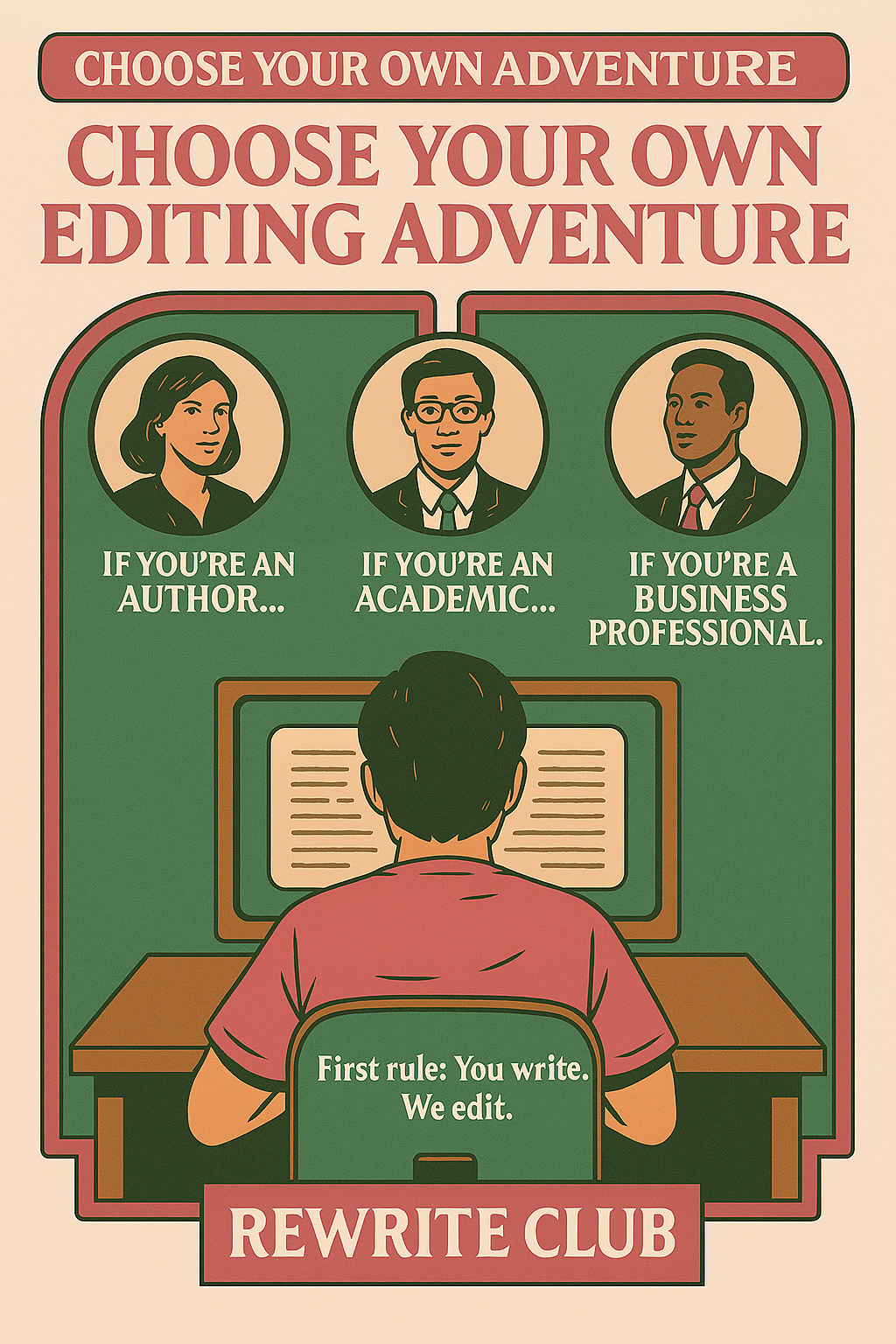7 Essential Tips to Crush Your College Essays and Personal Statements
Because One Great Essay Can Land You the Acceptance Letter–and the Scholarship.

Did you know that admissions officers spend an average of 6 to 8 minutes reading each college application? That's it. So, your college essay or personal statement doesn't have time to ramble–it has to hit. Fast.
Whether you're aiming for your dream school or fighting for scholarships, your essay must be dynamic, honest, and unforgettable. Here are Rewrite Club's top tips to help you write an essay that won't get tossed in the "meh" pile.
Let's dive into seven proven strategies from Rewrite Club's editors to help you ace your college essays, personal statements, and scholarship applications.
#1 Understand Your Audience
One of the fundamental aspects of crafting an incredible college essay is understanding who will be reading it. Admissions officers hail from various backgrounds and want to see authenticity and depth in your writing. Each college has its specific culture and values, so tailoring your message to fit these nuances is crucial.
REWRITE CLUB TIP:
Stalk the school's website. Dig into its mission, values, student life, and tone. Then tailor your essay to connect. Show them you're not sending the same cookie-cutter essay to 50 schools–you want this one. Highlight your findings in your essays. Instead of crafting a generic piece, add elements that resonate with the values and culture of the school. This makes it easier for the reader to connect with you, thus increasing your chances of standing out.
#2 Start With a Strong Hook
The opening lines of your essay can make or break your piece. Consider starting with a striking quote, a personal anecdote, or a thought-provoking question. A powerful hook draws the reader in and sets the tone for the entire essay.
For example, if you’re writing about a personal challenge, begin with a vivid image that encapsulates that experience. Let the readers feel what you felt at that moment. This emotional connection fosters engagement and encourages them to continue reading.
REWRITE CLUB TIP:
Boring intros kill otherwise great essays. You need a hook that grabs them by the collar and says, "You're going to want to read this." Open with a vivid moment, a bold line, or a question they can't ignore. Set the tone, stir curiosity, and don't hold back.
#3 Be Yourself; Own Your Story
The college essay allows you to present your authentic self to admissions officers. Focus on aspects of your life that are unique to you—your background, culture, personal experiences, and reflections. Committee members are looking for a glimpse into the person behind the grades and test scores. Share experiences that shaped your values, interests, and ambitions.
For example, if your family has a history of migration, speak about the impact this journey had on who you are today. Avoid common clichés, such as how sports taught you discipline, unless you can add a personal twist. The key is to celebrate your individuality while maintaining clarity in your storytelling.
REWRITE CLUB TIP:
Your essay isn’t a LinkedIn profile. It’s your shot to be real. Share the stuff that shaped you—failures, quirks, weird passions, messy victories. Tell the story only you can tell.
#4 Focus on Quality Over Quantity
Many students make the mistake of trying to cram in as much information as possible. Instead, aim for clarity and conciseness. A well-structured essay that communicates your ideas clearly and effectively often leaves a stronger impression than one that floods the reader with too many details or vague points.
To achieve optimal clarity, build your essay around a few key themes or experiences. Each paragraph should contribute to your overarching narrative, serving as a stepping stone to your ultimate objective—whether to showcase your skills or lay out your future aspirations. In turn, ensure that every point you make is relevant and contributes to the essay's purpose.
REWRITE CLUB TIP:
Less is more. Trying to cram your entire life story into 650 words? Hard pass. Instead, focus on one or two defining moments. Go deep, not wide. Every sentence should earn its place. Cut fluff. Keep fire.
#5 address challenges with authenticity
If you’ve faced challenges, setbacks, or personal tragedies, it’s valid to mention these experiences in your essays. However, the key lies in how you frame these challenges. Don’t just dwell on the struggle; reflect on what you learned and how it shaped your perspective moving forward. Admissions officers appreciate resilience and the ability to learn from difficult situations.
For instance, if you mention how the pandemic affected your education, frame it by discussing how it motivated you to adapt your learning methods. This approach displays growth, innovation, and resolve, which are compelling traits for college admissions committees.
REWRITE CLUB TIP:
Yes, you should write about challenges. But don’t make it a pity party. Show grit, growth, and what you did with the pain.
Faced hardship? Cool. Could you tell us what changed? How did you adapt? What do you see differently now?
#6 Revise, edit, and seek feedback
Writing is a process, and revising your college essay is just as crucial as writing the draft. After finishing your first draft, step away for a day or two. This will allow you to return with fresh eyes. As you revise, pay attention to flow, clarity, and coherence.
It can be beneficial to seek feedback from trusted sources. This may include teachers, peers, or family members who understand your story. They can offer perspectives you might not have considered or highlight areas that require clarity. Use their feedback to refine your writing further, ensuring your personality shines through.
REWRITE CLUB TIP:
Revise like you mean it. First drafts are supposed to suck. However, they give you the blueprint and the building blocks to craft your compelling masterpiece. The goal? Keep your voice, but make it cleaner, sharper, and stronger.
#7 Practice Makes Perfect
Finally, it is crucial to practice writing essays regularly. Set aside time specifically for this purpose. Experiment with different styles, tones, and structures. Whether drafting for a school assignment or writing a personal statement, each opportunity helps hone your skills.
Additionally, explore sample essays from successful applicants. Using these as reference points can inspire new ideas and approaches to crafting your narrative. However, be sure to maintain your own voice amidst inspiration. This is your story, and its authenticity should resonate throughout your writing.
REWRITE CLUB TIP:
The more you write, the better you get. Don’t wait for the “perfect” idea—just start. Study successful essays, sure. But don’t mimic them. You’re the hero of the story. Own your voice.
Putting it all together
In summary, crafting effective college essays, personal statements, and scholarship applications requires a blend of personal experience, clear communication, and thoughtful revision. Start strong, focus on what makes you unique, and frame your experiences to highlight growth. The aim is to present a compelling narrative that resonates with the admissions committee and reflects your true self.
Remember that every student has a story; your goal is to tell yours clearly and authentically. By doing so, you will position yourself as a standout candidate.
let us show you what we can do!
Writing a killer college essay takes guts, clarity, and a little strategy. Lead with what makes you you. Don't chase perfection–chase connection.
REWRITE CLUB TIP:
Need backup? Submit your essays to the Rewrite Club Editing Team for Proofreading or Editing.
Use code: CRUSH-IT and we will throw in 3 free Virtual Coaching Sessions.
Your story matters. Let's make sure it connects.

